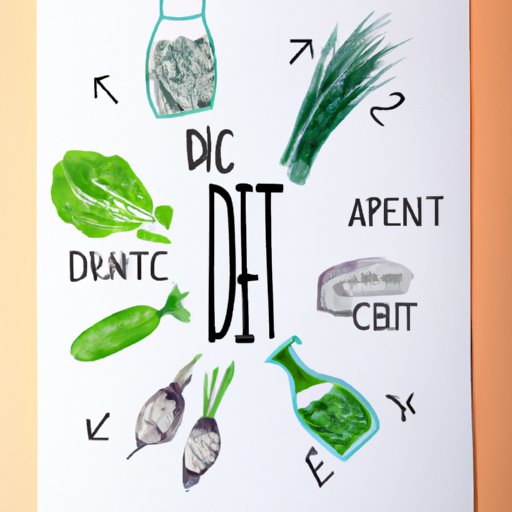Introduction
Nutrients are essential substances that your body needs to function properly. They provide energy for your body to perform everyday tasks, regulate bodily functions, and protect against diseases. Without a proper balance of nutrients in your diet, your body may not be able to work efficiently and may become vulnerable to health problems. This article will introduce you to the six key categories of nutrients and their role in maintaining overall health.
This article is intended for anyone who wants to learn more about the importance of nutrients and how they can be incorporated into a healthy diet. Whether you’re a health enthusiast or simply interested in improving your overall wellbeing, this article will provide valuable insights into the fundamental components of a healthy diet.
The Building Blocks of a Healthy Diet: Understanding Nutrients
Nutrients are divided into six categories: carbohydrates, proteins, fats, vitamins, minerals, and water. Each of these categories is essential for maintaining optimal health, and each plays a unique role in the body. Understanding these categories and the functions they perform can help you make informed decisions when it comes to choosing the right foods to include in your diet.
Carbohydrates are the body’s primary source of energy. They are broken down into glucose and used by the body for various bodily functions. Proteins are the building blocks of tissues and play a critical role in the growth and repair of cells, tissues, and organs. Fats provide a concentrated source of energy and are necessary for healthy cell membranes and nerve function. Vitamins are organic compounds that play essential roles in maintaining bodily functions such as vision, immune function, and blood clotting. Minerals, on the other hand, are inorganic compounds that support various systems in the body, such as muscle function and bone health. Lastly, water is a simple, overlooked nutrient that is essential for helping the body maintain a healthy balance of fluids and electrolytes.
From Carbs to Vitamins: A Comprehensive Guide to Nutrients
When it comes to maintaining a healthy diet, it’s important to consider each category of nutrients and how it contributes to overall health. Here we break down each nutrient category in more detail:
Carbohydrates
Carbohydrates are divided into two groups: simple and complex. Simple carbohydrates are sugars found in foods such as fruits and vegetables, and they provide an immediate source of energy. Complex carbohydrates such as whole grains, legumes, and starchy vegetables are broken down slowly in the body and provide a more sustained release of energy. They also contain fiber, which helps regulate the digestive system and promotes feelings of fullness.
Proteins
Proteins are essential for the growth and maintenance of tissues in the body. They are made up of amino acids that the body uses to build and repair cells and tissues. Animal products, such as meat, eggs, and dairy, are considered complete proteins because they contain all the essential amino acids the body needs. Plant-based proteins, such as legumes, nuts, and seeds, may need to be combined to ensure that the body gets all the necessary amino acids.
Fats
Fats are an important source of energy and help the body absorb fat-soluble vitamins such as A, D, E, and K. There are two types of fats: saturated and unsaturated. Saturated fats, found in animal products and some vegetable oils, can increase the risk of heart disease if consumed in excess. Unsaturated fats, such as those found in nuts, seeds, and fish, are beneficial to the body and can help lower cholesterol levels.
Vitamins
Vitamins are organic compounds that the body needs in small amounts to maintain normal bodily functions. There are 13 essential vitamins, divided into two categories: fat-soluble and water-soluble. Fat-soluble vitamins, such as A, D, E, and K, are stored in the body’s fatty tissues and liver and are not readily excreted. Water-soluble vitamins, which include vitamins B and C, are easily excreted and must be replenished regularly through diet or supplementation.
Minerals
Minerals are inorganic substances that the body needs in small amounts to maintain healthy bodily functions. They play a critical role in supporting bodily systems such as muscle function, heart function, and fluid balance. Some common minerals include calcium, iron, magnesium, and potassium.
Water
The human body is made up of approximately 60% water, making it an essential nutrient. Water plays a critical role in various bodily functions such as regulating body temperature, transporting nutrients and oxygen to cells, and removing waste products from the body. Adequate hydration is essential for maintaining overall health and wellbeing.
Behind the Food Labels: Demystifying Nutrients
When it comes to making informed decisions about your diet, it’s important to know how to read food labels. Food labels provide valuable information about the nutrient content of different foods, including the number of calories, fat, protein, and carbohydrates per serving. Understanding how to interpret this information can help you make informed decisions about the foods you choose to eat.
It’s also important to look for nutrient-dense foods. Nutrient-dense foods are those that provide a high concentration of essential nutrients relative to the number of calories they contain. Some examples of nutrient-dense foods include fruits and vegetables, nuts and seeds, whole grains, and lean proteins. Incorporating more of these foods into your diet can help you meet your nutritional needs while also helping you maintain a healthy weight.
Eat to Thrive: How Nutrients Fuel the Body
When it comes to maintaining a healthy diet, it’s important to remember that nutrients work in harmony with one another. Carbohydrates, proteins, and fats all work together to provide energy and fuel the body. Vitamins and minerals help support various bodily functions, while water plays a critical role in hydration and overall health.
Maintaining a balanced diet that prioritizes nutrient-dense foods can help ensure that your body is getting the nutrients it needs to function properly. Aim to incorporate a variety of foods from each nutrient category into your diet, and pay attention to how certain foods make you feel. Eating a diet rich in nutrients can help you feel energized and more focused throughout the day, while also helping to prevent chronic diseases.
Nutrient Density: Choosing Foods Rich in Essential Nutrients
When it comes to choosing healthy foods, it’s important to consider nutrient density. Nutrient-dense foods are those that provide a high concentration of essential nutrients relative to the number of calories they contain. By choosing nutrient-dense foods, you can help ensure that you are fueling your body with the nutrients it needs to function properly.
Some examples of nutrient-dense foods include leafy greens, berries, nuts, seeds, whole grains, legumes, and lean proteins. On the other hand, foods that are high in empty calories, such as processed snacks and sugary drinks, are low in essential nutrients and can contribute to weight gain and other health problems.
The Role of Nutrients in Preventing Chronic Diseases
A healthy diet that prioritizes nutrient-dense foods can help reduce the risk of chronic diseases such as heart disease, diabetes, and cancer. For example, a diet rich in fruits and vegetables can help reduce blood pressure and cholesterol levels, while also providing the body with nutrients that can help prevent cancer. Similarly, incorporating healthy fats such as those found in nuts and fish can help lower the risk of heart disease.
By maintaining a balanced diet that prioritizes nutrient-dense foods, you can help ensure that your body is getting the nutrients it needs to function properly and reduce the risk of chronic diseases.

Maximizing Nutrient Absorption: Tips for a Healthy Gut
While choosing nutrient-dense foods is an important part of a healthy diet, it’s also important to consider how these nutrients are absorbed by the body. The gut plays a crucial role in nutrient absorption and can impact how effectively the body is able to utilize the nutrients in the foods you eat.
To maintain a healthy gut, it’s important to eat a diet that is rich in fiber and probiotics. Fiber helps regulate the digestive system and promotes feelings of fullness, while probiotics help support healthy gut flora and improve nutrient absorption. Some examples of fiber-rich foods include fruits and vegetables, whole grains, and legumes, while foods that are high in probiotics include yogurt, kefir, kimchi, and sauerkraut.
Conclusion
Nutrients are essential components of a healthy diet and play a critical role in maintaining overall health and wellbeing. A balanced diet that includes all six categories of nutrients can help ensure that your body is getting the nutrients it needs to function properly. By understanding the role of each nutrient category and prioritizing nutrient-dense foods, you can help promote optimal health and reduce the risk of chronic diseases.
If you’re looking to improve your diet, consider making small changes that prioritize nutrient-dense foods. Incorporate more fruits and vegetables, choose lean proteins, and opt for whole grains over processed foods whenever possible. By making these changes, you can help set yourself up for a healthier, more vibrant life.
